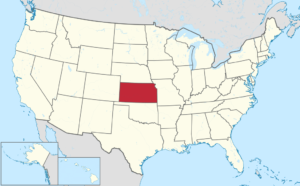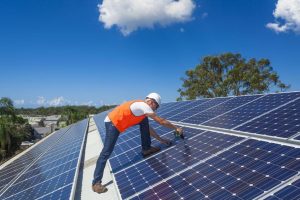 Kansas is a state that receives a lot of sunlight throughout the year. This makes this state an optimal area to harvest solar energy. The state can receive up to six hours of sunlight daily with, on average, 225 sunny days a year.
Kansas is a state that receives a lot of sunlight throughout the year. This makes this state an optimal area to harvest solar energy. The state can receive up to six hours of sunlight daily with, on average, 225 sunny days a year.
Having a lot of sunlight is excellent. You receive more energy from your solar system, resulting in more savings over the long run and value for your invested capital.
There’s a lot of untapped potential in the solar energy sector; Kansas produces an average of 33.72 megawatts of solar power. These figures are low when compared to other states like Texas and California.
Kansas recently repealed its Renewable Energy Portfolio Standard and introduced a voluntary system. This means that utilities are not obliged by law to increase solar and other renewable solutions as their main modes of generating electricity.
As a result, utility providers can continuously increase the energy cost they generate from their alternative sources rather than encourage consumers to generate their own using solar PV.
Solar power remains a feasible alternative to your energy solutions in Kansas. The incredible sun intensity makes a 5kW solar system a viable solution for an ordinary home.
This system offers excellent value and a balance between upfront costs and savings. The average price of a 5kW system in Kansas is around $30,000. The benefit of installing a solar system in Kansas is that it starts generating electricity immediately, so you start saving instantly.
Due to the generous sunlight available, you can save up to $900 in electricity expenses in the first year. You can expect a payback period of 14-20 years.
Most laws regarding solar panels are mainly set to encourage residents to switch to solar. These laws come in the form of incentives, rebates, and tax exemptions. Here are the solar panel laws in Kansas.
Contents
Key Takeaways
- Kansas has abundant sunlight, making it an ideal location for solar energy generation, offering significant savings and value for investments.
- Kansas recently repealed its Renewable Energy Portfolio Standard, making renewable energy adoption voluntary for utilities, potentially affecting the growth of solar energy.
- Kansas offers federal tax credits, property tax exemptions for solar panels, and a robust net metering system to incentivize residents to switch to solar power.
Federal Tax Credit
The federal government offers residents a 30% tax credit cut for anyone who acquires a solar system. This perk, known as the Investment Tax Credit (ITC), allows you to cut 30% of the initial cost of your solar system from the taxes you owe the government.
The total cost should also include the installation costs, the solar panels, and auxiliary components. If your solar energy system set you back $20,000, the federal solar tax credit would be $6,000.
You can deduct that amount from the taxes that are due. If you don’t pay enough tax to make a full deduction in a year, you can split the deduction into subsequent years.
This tax credit applies to those who buy the solar system with cash and those who purchase with a loan. You don’t have to pay any initial money to qualify.
Users who take a solar loan can use the tax credit cuts to pay for the loan’s initial installments. Since you don’t have to pay electricity charges, you continue saving more and using the saved money to offset the loan.

Property Tax Exemption
Kansas has passed a law that exempts solar panels from being included in property taxes. When you install a solar system in your house, the solar panels increase your house’s value. Property taxes are paid according to the property and house-owned value; thus, when the property value increases, the property taxes also increase.
In Kansas, solar power systems are exempted from property taxes. Valuers should not include the value added by the installation of solar panels. This saves property owners thousands of dollars in the long haul as solar panels increase a house’s value by an average of $18,000.
Solar power is exempt from property taxes only. You must pay sales tax to buy solar panels and other components.
Net Metering In Kansas
Kansas has a robust net metering system. Utility providers do the net metering and serve many benefits to owners who own PV systems.
Net metering allows customers who have installed solar power systems in their households to connect to the grid. When your solar system produces more power than you need in your household, the extra power is adopted by the grid and distributed to other customers.
When the grid adopts energy, you earn solar credits. These solar credits can be used to offset your electricity bill.
There’s minimal sunlight when you use more energy than your solar system can provide, i.e., during the winter. These solar credits can be netted off your total electricity costs. The solar credits are rolled off to subsequent months. This means you can generate enough credits in the summer to offset the electricity consumed in winter, where solar energy production is low.
The solar credits are, however, not carried off to subsequent months indefinitely. The credits expire after 12 months. There’s no financial compensation for expired credits. This should not be a problem if you size your solar system correctly to fit your household’s needs.
It’s important to note that state-owned utilities and cooperatives are not forced to comply with the net metering policy, so that it may be unavailable in some areas.
However, many cooperatives have opted to provide net metering to their customers. There’s no standard interconnection policy; every utility sets its requirements.

Case Study: Residential Solar Installation in Kansas
Background
In Wichita, Kansas, a family was motivated to switch to solar energy to reduce their carbon footprint and take advantage of the state’s favorable solar policies. This case study details the steps taken and the results achieved through this residential solar installation.
Project Overview
The family contacted Solar Panels Network USA with the goal of installing a solar system that would fully meet their household energy needs. They aimed to leverage Kansas’s net metering policies, federal tax credits, and property tax exemptions to maximize their investment.
Implementation
Our team began with a detailed site assessment, evaluating the roof’s orientation, potential shading, and structural integrity. Based on these factors, we designed a 5 kW solar system featuring high-efficiency photovoltaic panels and a state-of-the-art inverter to convert the generated power into usable electricity.
We coordinated with the local utility provider to ensure compliance with Kansas’s net metering policy. The system was optimized for peak energy production during the sunniest hours and configured to send excess energy back to the grid.
Results
The installation process went smoothly, and the solar system was seamlessly connected to the grid. The family immediately began benefiting from Kansas’s net metering policy, earning 1:1 retail rate credits for the excess electricity generated, which significantly reduced their monthly utility bills.
Additionally, the family utilized the federal solar tax credit, lowering their overall installation costs by 30%. They also benefited from the Kansas property tax exemption, which ensured that the value added by the solar panels did not increase their property taxes. This financial benefit, coupled with the immediate savings from reduced electricity bills, made the investment highly attractive.
Summary
This case study highlights the successful implementation of a residential solar system in Wichita, Kansas. By effectively navigating and utilizing local solar laws and incentives, the family achieved energy independence and maximized their financial returns. Solar Panels Network USA’s expertise in managing utility negotiations and understanding solar policies was crucial in overcoming potential challenges, emphasizing the importance of professional guidance in residential solar projects.
Expert Insights From Our Solar Panel Installers About Solar Panel Laws in Kansas
Kansas’s abundant sunlight and net metering policies make solar energy an excellent investment. Homeowners can earn credits for excess energy production, significantly reducing their electricity costs over time.
Senior Solar Installer
The repeal of Kansas’s Renewable Energy Portfolio Standard might slow down utility-driven renewable energy adoption, but individual homeowners can still benefit greatly from federal tax credits and property tax exemptions.
Lead Solar Technician
Property tax exemptions for solar installations in Kansas ensure that homeowners do not incur additional property taxes, despite the increase in property value. This financial incentive makes solar a smart choice for long-term savings.
Chief Solar Installation Engineer
Experience Solar Excellence with Us!
Trust in Solar Panels Network USA, where our seasoned experts deliver top-quality solar solutions for homes and businesses nationwide. With a legacy of countless successful installations and a commitment to sustainable energy, we’re your reliable partner in the solar journey. Ready for a brighter, eco-friendly future? Call us now at (855) 427-0058 and harness the power of the sun!
Map image by Wikimedia Commons User: TUBS / CC-BY-SA-3.0
About the Author
Solar Panels Network USA stands at the forefront of solar energy solutions, driven by a team of seasoned solar engineers and energy consultants. With over decades of experience in delivering high-quality solar installations and maintenance, we are committed to promoting sustainable energy through customer-centric, tailored solutions. Our articles reflect this commitment, crafted collaboratively by experts to provide accurate, up-to-date insights into solar technology, ensuring our readers are well-informed and empowered in their solar energy decisions.

